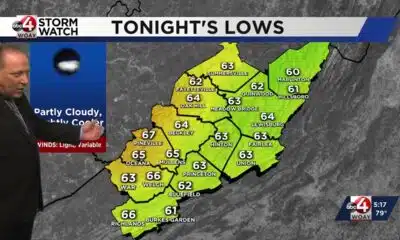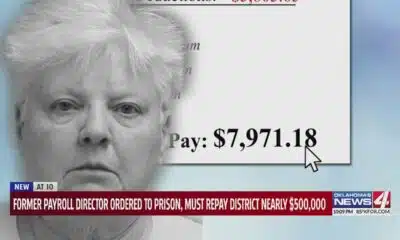News from the South - Arkansas News Feed
Arkansas senator continues mission to eliminate State Library Board, cites unfulfilled bargain
Arkansas senator continues mission to eliminate State Library Board, cites unfulfilled bargain
by Tess Vrbin, Arkansas Advocate
March 17, 2025
A legislative proposal to dissolve the Arkansas State Library Board “will remain on the table” after the board did not take action that bill sponsor Sen. Dan Sullivan requested, he told the Advocate Friday.
The library board narrowly rejected two motions put forth by member Jason Rapert of Conway, Sullivan’s former Senate colleague, during a special meeting Thursday. Later, the board passed a motion proposed by Lupe Peña de Martinez of Mabelvale, who said she “trusted” that the Jonesboro Republican would respond by withdrawing Senate Bill 184 from consideration.
As first written SB 184 would eliminate both the State Library Board and the Arkansas Educational Television Commission, which oversees Arkansas PBS, and transfer the boards’ powers and authorities to the Arkansas Department of Education.
Thursday’s library board meeting came a week after Arkansas Educational Television Commission Chairman West Doss said a discussion he had with Sullivan “saved the commission” from dissolution.
Arkansas State Library Board approves proposal aimed at keeping it alive
Sullivan has since said he is amending SB 184, which passed the Senate Feb. 17, to remove the Arkansas Educational Television Commission. An amendment hadn’t been posted on the Legislature’s bill monitoring website as of Friday evening. A House committee has yet to hear the bill.
Library board member Peña de Martinez also spoke to Sullivan before last week’s meeting. He told her he would “pull” the bill if the board developed “non-binding policies to protect children,” she said Thursday. The board voted 4-3 to pass the motion she introduced to create such policies.
In an interview with the Advocate Friday, Sullivan said he told Peña de Martinez and other board members that his “preference would be to see two things: that the library board have policies that protect children and that it disaffiliate itself from the American Library Association.” He was referring to the national nonprofit trade association that advocates for public libraries and helps them secure grant funding. It also accredits master’s of library science degree programs.
Peña de Martinez said Thursday that Sullivan’s “exact words” to her were “‘Develop non-binding policies to protect children and I will pull Senate Bill 184’… at least two or three times.”
On Friday, Peña de Martinez corrected herself and confirmed that Sullivan expressed both of his wishes in their conversation. She reiterated a concern she expressed at February’s regularly scheduled board meeting: that she is not aware of any “high-caliber” body that could replace the ALA in accrediting higher education programs for librarians in training.
She also said she made Thursday’s motion “in good faith” and was “disappointed” in Sullivan’s response.
“I’m a lifelong educator,” she said. “I want nothing more than to protect children, and I think I’ve been clear on that.”
YOU MAKE OUR WORK POSSIBLE.
‘Non-binding’
Rapert made both of the motions that the board rejected Thursday by the same 4-3 vote. One would have eliminated all references to the ALA from the board’s documents; the other would have created an ad hoc committee of board members that would make recommendations to “protect children from sexually explicit materials” in public libraries.
The second motion would also have sought assistance from the Department of Education and the state attorney general to compile rules for the board to adopt in order to withhold state funds from libraries where “sexually explicit” content is within children’s reach.
All three of Republican Gov. Sarah Huckabee Sanders’ appointees to the library board — Rapert, Shari Bales of Hot Springs and Sydney McKenzie of Rogers — voted against Peña de Martinez’s motion and voted for Rapert’s motions. McKenzie is the newest member and the wife of Rep. Brit McKenzie, R-Rogers.
Pam Meridith of Cherokee Village and Jo Ann Campbell of Fort Smith joined Peña de Martinez and board chairwoman Deborah Knox of Mountain Home in voting for the motion that passed while opposing the two from Rapert.
“I could simply not support Mr. Rapert’s motions yesterday, even though that probably does spell the end of our board,” Knox said in an interview Friday.
Knox also said she was not sure what the State Library Board could do to satisfy Sullivan besides its passage of Peña de Martinez’s motion. Sullivan acknowledged Friday that “non-binding policy” is “all they can do.”
Peña de Martinez’s motion specified that the policies to be developed will honor “the constitutional and legislative principles of intellectual freedom, including First Amendment protections.” It also emphasized that libraries are required to “exercise due care in [the] selection, classification and access for materials.”
Knox said the First Amendment language “was a very important part of the motion” since Rapert’s attempts to regulate where “sexually explicit” books are located “really interferes with the First Amendment right people have to go to the public library and choose the books of their choice.”
She also said local libraries do “very well” at protecting children from inappropriate content “because I think they know how to classify their books and house them appropriately.”
Meredith made a similar comment Thursday, but Rapert disputed this point and decried Peña de Martinez’s motion as “senseless.”
“You all would love to do something non-binding because it has no effect. It does nothing,” Rapert said. “You have no intention of protecting Arkansas children.”
Campbell mentioned that Rapert’s motion to create a committee focused on governing libraries’ management of explicit materials included the phrase “non-binding guidance.”
“I’m sorry, this is a library board: can’t we read?” Rapert replied. “It is an agenda item. That’s not a motion.”
Knox said Friday she agreed with Peña de Martinez that the motion the board approved should have fulfilled Sullivan’s wishes.
Sullivan, however, told the Advocate the board made a “conscious choice” that was “just the opposite” of the Arkansas Educational Television Commission’s actions.
“When the state says our policy is the safety and protection of children … that’s what the library board should do,” the Jonesboro Republican said. If librarians already do well at protecting children, as one board member put it, “how hard is it to develop guidelines to make sure you’re doing what you say you’re doing?”
“My goal is to eliminate the state library board,” he said.
ALA debate
Rapert has repeatedly pushed for defunding libraries where minors can access inappropriate content, and he has said the State Library Board should be abolished for not supporting these efforts.
At February’s regular meeting, Rapert proposed that the State Library remove the ALA from its policies detailing its power to fund public libraries and scholarships for aspiring librarians. The board rejected the proposal.
Rapert and Sullivan have both criticized the statement within the ALA’s Library Bill of Rights that access to libraries should not be restricted based on a person’s age. Far-right conservatives nationwide who object to the public availability of certain content have claimed this is proof that the ALA believes in forcing content about sexual activity and LGBTQ+ topics onto children.
Emily Drabinski, ALA’s president in 2023, called herself a Marxist in a 2022 tweet after being elected into the role. Rapert and Sullivan have said this means the ALA supports a political agenda and expects libraries to do the same.
Sullivan mentioned Drabinski’s tweet in a February committee hearing over a bill he sponsored that is now Act 242 of 2025. The law removes the state’s requirement for public library directors in Arkansas to hold a master’s degree “from an accredited American Library Association program,” and allows someone with “work experience in the field of library operations” but without a master’s degree to run a library with approval from its local governing board.
Bill to loosen education requirement for public library directors heads to Arkansas House
Knox said Friday that “one outspoken president” of ALA does not represent the organization as a whole and she could not “in good conscience” support cutting Arkansas’ ties to a group that helps local libraries.
Peña de Martinez agreed, saying “the last thing we want is to dilute education.”
“We say we’re an education state,” she said, referring to a comment Sanders has made several times, “yet we want to reduce the qualifications for librarians. It’s nonsensical to me that the political leanings of one former head of an organization would be enough for us in Arkansas to completely disregard the accreditation standards.”
State libraries in some Republican-led states, including Missouri and Texas, cut ties with the ALA in 2023, and other states have made similar efforts since then.
Late Wednesday night, Sullivan submitted an amendment to House Bill 1127, the bill to give the Arkansas State Library its spending authority for fiscal year 2026.
If the bill becomes law with the amendment included, the State Library would not be allowed to “budget, allocate, or expend any funding to any library” that is affiliated with the ALA, including as a member; refers to the ALA in any of its official documents; or “makes payments or grants of any kind” to the organization.”
A bill with a similar mandate for Iowa libraries has been advancing in that state’s legislature , according to the Iowa Capital Dispatch. The bill includes a ban on funding libraries affiliated with the state’s chapter of ALA, the Iowa Library Association.
Sullivan once said the Arkansas Legislature should defund the Arkansas Library Association, which does not receive state funding.
The Joint Budget Committee adopted Sullivan’s amendment to HB 1127 Thursday morning. Rapert informed the Arkansas State Library Board of the amendment at Thursday’s meeting and said it should have motivated the board to detach the State Library from the ALA.
Joint Budget’s Special Language subcommittee will be responsible for approving the amendment before the committee votes on the entirety of HB 1127. The subcommittee’s next meeting will be at 9 a.m. Tuesday.
PBS negotiations
After his ALA-related motion failed Thursday, Rapert said the board had “sunk” itself and would “walk the plank.” He also said Arkansas PBS “at least was smart enough in their commission to make some changes.”
Doss, the commission chairman, explained those changes in an interview Friday, saying he hopes Sullivan can be “an asset” to Arkansas PBS. Sullivan’s “hot buttons” include “corporate governance” and services for homeschooled children, and Arkansas PBS will focus on how best to handle both of those things, Doss said.
Sanders appointed Sullivan’s wife, Maria Sullivan, to the Arkansas Educational Television Commission last year. Doss said Maria Sullivan is set to lead an Arkansas PBS task force aimed at better serving homeschoolers.
“We hope we’re well on the way to healing all around, and we’ll continue to build PBS,” Doss said.
He said at the commission’s March 6 meeting that the agency would be “a propaganda arm for whoever is in power,” regardless of the dominant political party, if it were no longer governed independently of the Department of Education.
Sullivan told his colleagues the same day that he had drafted an amendment to remove Arkansas PBS from SB 184. As of Friday afternoon, the amendment was not available on the Legislature’s website, and Sullivan has not filed any new legislation pertaining to the State Library.
“We’ve come up with a resolution I think we can work together on,” Sullivan said just before the Senate unanimously approved Senate Bill 64, Arkansas PBS’ fiscal 2026 spending authority.
Discussion with bill sponsor ‘saved’ Arkansas PBS governing board from dissolution, chairman says
SB 64 failed on the House floor Wednesday but can be taken up as many times as needed before the end of the legislative session next month. Appropriation bills need three-fourths of each chamber’s approval, and the House voted three times each to pass the agency’s fiscal 2023 and 2025 appropriations.
Sullivan unsuccessfully tried to reduce Arkansas PBS’ spending authority in the 2022 and 2024 fiscal sessions. He has been a vocal critic of Arkansas PBS, particularly since its regularly scheduled 2022 audit indicated that administrators might have sidestepped state laws related to contract bidding. A specially requested audit that concluded last year led auditors to forward the findings to a prosecuting attorney.
Arkansas PBS CEO Courtney Pledger told lawmakers in September that the agency had learned from its “mistakes and errors.”
Editor Sonny Albarado contributed to this story.
GET THE MORNING HEADLINES.
Arkansas Advocate is part of States Newsroom, a nonprofit news network supported by grants and a coalition of donors as a 501c(3) public charity. Arkansas Advocate maintains editorial independence. Contact Editor Sonny Albarado for questions: info@arkansasadvocate.com.
The post Arkansas senator continues mission to eliminate State Library Board, cites unfulfilled bargain appeared first on arkansasadvocate.com
News from the South - Arkansas News Feed
Idaho is losing OB-GYNs. Doctors who remain are trying to shoulder the extra burdens.
by Kelcie Moseley-Morris, Arkansas Advocate
August 13, 2025
Before Dr. Harmony Schroeder left her OB-GYN practice in Idaho last year for Washington, she’d had many conversations with legislators and others about how to feel safe practicing in a state with a near-total abortion ban that includes criminal and civil liabilities for violating the law.
Schroeder wanted to stay. She’d practiced in Idaho for nearly 30 years, with a patient list of about 3,000 and a group of doctors she loved. She thought once elected officials understood that a ban would mean poorer medical care and more negative outcomes, things would improve.
Instead, they got even worse, as women were airlifted out of state during a period without protection for emergency abortion care under federal law.
Schroeder felt like she was either compromising care for women or compromising herself by risking jail time.
Providers convicted of breaking the law face up to five years in prison, revocation of their medical license and at least $20,000 in civil penalties.
“People said, ‘Oh, we would never really put you in jail,’” she said. “Sometimes it felt like the legislature was giving us a pinky swear.”
Schroeder is one of 114 OB-GYNs who left Idaho or stopped practicing obstetrics between August 2022 and December 2024, according to data from a peer-reviewed study published in JAMA Open Network, a division of the Journal of the American Medical Association. That number represents 43% of the 268 physicians practicing obstetrics statewide, a higher figure than previous reports indicated.
The study showed 20 new OB-GYNs moved to Idaho during that same period, for a net loss of 94 physicians.
Subscribe to Reproductive Rights Today
Want a better understanding of abortion policy in the states? Sign up for our free national newsletter. Reproductive Rights Today is a comprehensive daily wrap-up of changes to reproductive rights in the states, the front lines in the fight over abortion access in a Post-Roe America.
It’s not the only state with a ban experiencing shifts in numbers of obstetrics providers, but it is one of the most acute. Physicians in Texas, Tennessee, Oklahoma and other ban states have spoken to the media and researchers to say they are leaving the state or retiring from the practice because of bans, and while the numbers may not always be statistically significant, the departures are often in states that already have maternal health care shortages.
The states with the highest percentage of maternity care deserts as of 2024 were North Dakota, South Dakota, Oklahoma, Missouri, Nebraska and Arkansas, according to March of Dimes. With the exceptions of North Dakota and Nebraska, every state in that list has a near-total abortion ban in place.
Out of the 55 OB-GYN physicians Idaho lost just in 2024, 23 moved out of the state, 12 retired, and 16 either shifted their practice to gynecology only or moved from a rural to urban practice site. The remaining moved elsewhere in state. All of those who moved away moved to a state that did not have abortion restrictions similar to Idaho’s.
As of 2018, four years before the U.S. Supreme Court’s Dobbs v. Jackson Women’s Health Organization decision that ended federally protected access to abortion, Idaho needed 20 more OB-GYNs to meet demand, according to a report from the U.S. Department of Health and Human Services.
Schroeder likes her new practice in Washington, but she is still sad about the realities that forced her to leave.
“I wish it didn’t have to be this way,” she said.
Study proves ‘what we feared was happening’
Susie Keller, CEO of the Idaho Medical Association, said the losses feel worse because Idaho already consistently ranked at the bottom of nationwide rankings for physician-to-patient ratios even while the population has exploded in recent years.
The Centers for Disease Control and Prevention ranked Idaho lowest in 2019 for overall patient-to-doctor ratios, and the conservative Cicero Institute ranked it 50th in 2024. According to a report from the Idaho Coalition for Safe Healthcare, the ratio of patients to obstetricians increased from 1 per 6,668 Idahoans to 1 for every 8,510 Idahoans between August 2022 and November 2023.
Keller said the medical association has tried hard to find solutions that would help retain physicians, including failed efforts over the past two years to add a health exception in the abortion law.
“Every time there’s been some sort of event that sustained this difficult environment or made it worse, we heard about folks leaving,” Keller said.
The study, which was led by Dr. J. Edward McEachern, is a clear demonstration of what Keller said the medical association already knew anecdotally. It’s also proof, she said, for the elected officials who have accused them of fabricating stories or data and exaggerating the situation. Idaho Attorney General Raúl Labrador said in June 2024 that Idaho doctors who left were doing so because they made “the vast majority of their money” from performing abortions, but he did not provide evidence for that claim. Republican Rep. Brent Crane, who is chairman of the committee where abortion-related legislation would be considered, said in April 2024 that hospital legal counsel was being disingenuous with providers about the vagueness of the law because they want to undermine and ultimately repeal it.
“This kind of dialed-in study really gives us a very clear picture of what we had feared was happening,” Keller said.
Among clinics, not everyone is in agreement about the problems. Scott Tucker, practice administrator for Women’s Health Associates in Boise, said the providers they have lost over the past three years were mostly due to other factors. Increases in clinic wait times are up across the valley because of population growth, he said, and there is a national shortage of OB-GYNs and primary care providers.
“(Idaho’s abortion ban) really hasn’t impacted us much, other than we get a lot of questions and a lot of requests for contraception counseling,” Tucker said.
He added that while it’s never easy to recruit new physicians, and the ban has created extra challenges, they’ve onboarded a new physician once every nine months for the past four years and have two candidates slated to start in 2026. Much of the interest comes from candidates in the Midwest and the East, he said, and “much of what they’re hearing is hyperbole.”
‘I don’t know if it’s fair to the public for them to never feel like this is a problem’
Dr. Becky Uranga practiced with Schroeder for 14 years at OGA, a physician-owned OB-GYN clinic in the Boise area. She watched Schroeder leave, along with another doctor at OGA who went into a different medical field and one who retired.
In June, another longtime OB-GYN announced his departure. Dr. Scott Armstrong, who had practiced in the area for 26 years, sent a letter to patients saying his last day at OGA will be on Oct. 17, when he will move back to the Midwest “to help care for my aging parents and embark on a new chapter in my life.”
Uranga said the practice will have eight practicing OB-GYNs by October — down from 12 a few years ago. And the closure of other labor and delivery units in the area, which is the most populous in the state, has increased workloads for clinics like OGA as well. Uranga’s practice provides the full spectrum of obstetrics and gynecological care for women of all ages, including surgeries and labor and delivery.
“All those people (from the closed clinics) then came to us,” Uranga said.
What used to be two or four deliveries on average in a 24-hour shift is now five to six.
“That’s a lot, and it’s a really special moment that you want to be all in, present and available for whatever could happen … and it doesn’t feel like that anymore,” she said.
When a physician leaves, especially ones that have been practicing for a long time, Uranga said it leaves a hole. Schroeder had 3,000 patients, and many of them were receiving care for menopause, which she specialized in. Uranga sought out extra training to become board certified in menopause care to fill that gap.
While they juggled the transition with fewer physicians, OGA temporarily limited new patients for certain services, including some Medicaid patients. Uranga also isn’t traveling to a rural area of Idaho anymore to provide surgeries, something she and Schroeder used to do together.
When she’s not doing clinic visits, patient calls, surgeries or deliveries, she’s helping with organizing and fundraising efforts for the reproductive rights ballot initiative that would restore abortion access in Idaho. And in between all that, she’s scheduling recruiting calls with potential physicians.
She recently had to tell a recruitment coordinator that they need to be transparent up front about Idaho’s abortion laws, because she wasted too much time talking to candidates who responded with a hard no after learning about the medical environment.
“My nurse will tell you that I am fitting people in before, during, and after (hours) all the time, which isn’t fair to my family, it’s not fair to my nurse, and I don’t know if it’s fair to the public for them to never feel like this is a problem,” Uranga said.
This story has been updated.
Arkansas Advocate is part of States Newsroom, a nonprofit news network supported by grants and a coalition of donors as a 501c(3) public charity. Arkansas Advocate maintains editorial independence. Contact Editor Sonny Albarado for questions: info@arkansasadvocate.com.
The post Idaho is losing OB-GYNs. Doctors who remain are trying to shoulder the extra burdens. appeared first on arkansasadvocate.com
Note: The following A.I. based commentary is not part of the original article, reproduced above, but is offered in the hopes that it will promote greater media literacy and critical thinking, by making any potential bias more visible to the reader –Staff Editor.
Political Bias Rating: Left-Leaning
This content highlights the negative consequences of strict abortion bans on healthcare providers and patient care in Idaho, emphasizing the challenges faced by OB-GYNs and the resulting healthcare shortages. It presents critical perspectives on the state’s abortion restrictions and includes voices advocating for reproductive rights, which aligns with a left-leaning viewpoint that supports abortion access and critiques restrictive policies.
News from the South - Arkansas News Feed
Look inside the newly-renovated Greer Lingle Middle School in Rogers
SUMMARY: Greer Lingle Middle School in Rogers reopens after being closed for over a year due to tornado damage causing $12.7 million in repairs. Renovations include new floors, ceilings, lights, and updated hallways. Contractors are finishing final touches inside and outside the building as 680 students prepare to return. Principal Eric Sokol praised the community’s resilience and noted the academic challenges faced during the temporary relocation to Rogers New Tech. Despite delays, students had a solid year. The renovated school features a new science classroom and library, aiming to create a safe, welcoming environment. Some projects, like the performing arts center, remain underway.
Students in the Rogers School District return to class on Wednesday
Subscribe to 40/29 on YouTube now for more: http://bit.ly/PTElbK
Get more Northwest Arkansas news: http://www.4029tv.com
Like us: http://facebook.com/4029news
Follow us: http://twitter.com/4029news
Instagram: https://www.instagram.com/4029news/
News from the South - Arkansas News Feed
U.S. Education Secretary visits Arkansas
SUMMARY: U.S. Education Secretary Linda McMahon visited Arkansas as part of her nationwide tour promoting the return of education control to states. Meeting with Governor Sarah Huckabee Sanders at Dunn Roberts Elementary School in Little Rock, McMahon emphasized dismantling the Department of Education to reduce federal bureaucracy and increase local decision-making. The Trump administration argues this shift will expand family choices and empower communities, while critics warn it may reduce oversight and harm vulnerable students. McMahon highlighted Louisiana’s educational improvements as a model. After Little Rock, she toured the Saline County Career and Technical campus in Benton. Full coverage will follow in evening news.
U.S. Secretary of Education Linda McMahon is visiting Arkansas as part of the “Returning Education to the States” 50-state tour.
-
News from the South - Oklahoma News Feed6 days ago
Former payroll director ordered to prison, must repay district nearly $500,000
-
News from the South - Texas News Feed7 days ago
Jim Lovell, Apollo 13 moon mission leader, dies at 97
-
News from the South - Alabama News Feed7 days ago
Community Fundraisers Support Family of Mountain Gap Student Killed on Bike | Aug. 8, 2025 | News 19
-
News from the South - Tennessee News Feed6 days ago
Dollywood shares hints about new attraction coming in 2026
-
News from the South - Georgia News Feed6 days ago
GBI identifies Emory University, CDC shooting suspect
-
Local News7 days ago
Trump says he will meet Putin next Friday in Alaska to discuss ending the Ukraine war
-
News from the South - Louisiana News Feed6 days ago
Rural emergency rooms are increasingly run without doctors, experts say
-
News from the South - Georgia News Feed6 days ago
Patrick Joseph White: Who is the accused Emory and CDC shooter?










































